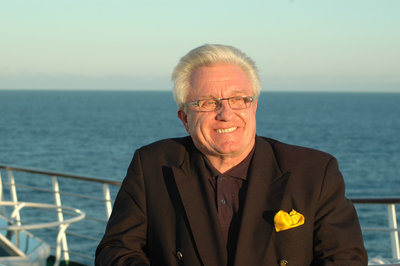On a cold, moonless night 100 years ago, over 1,500 lives were lost when the Titanic sank in the North Atlantic during the early hours of April 15. Last weekend, ocean liner and cruise ship expert Bill Miller was among approximately 600 passengers aboard the Azamara luxury cruise liner on the Titanic Centennial Cruise that revisited the very spot where the fated ship went down. As an invited guest speaker, Miller was scheduled to give an overview of the entire 20th century of ocean liners and how the ships and the industry have evolved.
“There is some kind of electrical connection to the Titanic,” said Miller. A former Hoboken educator and now Secaucus resident, Miller has sailed on over 450 voyages and authored 80 books about the great liners of the past as well as modern day cruise ships.
“The anniversary signifies the enduring obsession with what is the most famous ship of any kind in the world,” said Miller. Built in Belfast, Northern Ireland, the 882-foot long Titanic was the largest and most luxurious passenger ship of its kind. The ship had fine dining, libraries, a Turkish bath, a gymnasium, a swimming pool, and a squash court.
It departed on April 10, 1912 from Southampton, England for its maiden voyage to New York. Four days into the trip, on a night that reached freezing temperatures, the liner hit an iceberg that ripped a 300-foot gash along the ship’s starboard side.
“She was supposed to be the technological wonder of her time,” noted Miller. “She was declared unsinkable…a misguided declaration.”
He said the ship had reinforced steel, concealed sections to stop flooding, and special compartmentalization, none of which saved the Titanic from a watery grave.
“You rarely hear of a ship sinking on her first voyage,” said Miller. While the ship was equipped with a number of advanced features for its time, only 705 of the 2,223 passengers aboard survived because many, especially men and third class passengers on the lower decks, did not make it into the lifeboats, which were also not filled to capacity. First class passengers, women and children were more likely to survive.
“No other ship was ever declared unsinkable again.” – Bill Miller
__________
Titanic-themed travel
“It is a link with history,” said Miller about the Centenniel Cruise. “It is thrilling, but it is a little eerie too.” People aboard the special cruise had the opportunity to experience what it was like on the Titanic with appropriately themed food and entertainment. Passengers were asked to dress-up like the passengers did on the Titanic.
“You are immersed in the whole ambiance of the Titanic, and the tragedy of 100 years ago will be brought forward to make it seem like you were there,” noted Miller before the voyage. “Many people when they think about this are brought to tears.”
Miller said that passengers most likely won’t find any limbo dancing or boogie nights on the Lido deck on the cruise, but rather violins and classical music typical of the Edwardian period, named after King Edward VII, who reigned over the United Kingdom from 1901-1910. As of last week, a day before the voyage, Miller had not decided on what he was bringing for the holiday costume party.
Miller said that the passengers aboard the ship will likely consist of die-hard Titanic enthusiasts from over 100 societies that hold a convention each year around the anniversary of the ship. The convention this year, which was moved because of the centennial cruises, will be held in Secaucus at the Holiday Inn from April 27-29. The other types of passengers, he said, are individuals that like to experience something a little different. Altogether seven Titanic-themed cruises were planned.
Lessons from the tragedy
“It was senseless and ruthless and it shouldn’t have happened…No other ship was ever declared unsinkable again,” said Miller. “No one ever used the name Titanic again.” Miller said that the loss of the Titanic holds many lessons. It sheds a light on inequalities in class, human ineptitude, overconfidence, and the eventual decline of the British Empire.
“It has greatly improved safety standards,” said Miller. He said ships used to shut down radio communications at night but after the Titanic that all changed. Lifeboats have more than enough space, they have modern communications within, and ships have emergency lighting in case the power goes out.
“There will never be a time when we are accident-proof,” said Miller. He gave the example of the Costa Concordia, which in January crashed into a rock and capsized near the Italian coast. Sixteen people died and 22 are still missing. Miller said dangers remain on cruise ships such as running aground and fires, but that a tragedy at the level of the Titanic is less likely.
“It is the most comfortable and safest way to travel,” said Miller. He took his first cruise with his grandmother in 1961 to visit Bermuda, and since then he hasn’t stopped traveling the world by sea.
“To look at the blue sea and feel the wind on your face and the flags fluttering – that was magic,” said Miller.
As a teacher, he took advantage of his summers to travel. Today, he is away 200 days a year as a guest lecturer on ships.
